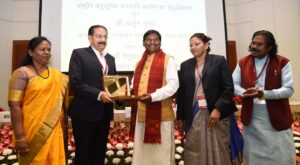Arjun Munda Inaugurates the Function to Celebrate “16TH Foundation of Day of NCST”

Arjun Munda, Union Minister for Tribal Affairs inaugurated the function to celebrate “16th Foundation of Day of National Commission for Scheduled Tribes (NCST)” organised by National Commission for Scheduled Tribes (NCST) here today. He delivered keynote address on the occasion. Renuka Singh Saruta, Minister of State for Tribal Affairs was the Guest of Honour. Nand Kumar Sai, Chairman, NCST and members of the Commission and many dignitaries were present.
Arjun Munda presented awards for exemplary service towards Scheduled Tribes in the country to (i) CPSU – Western Coalfields Ltd. Nagpur (Shri Rajiv Ranjan Mehra, CMD received the award) and (ii) Individual ( Ajay Kumar Jaiswal, Secretary, ASHA, Ranchi received the award).

Delivering keynote address, Arjun Munda said that the National Commission for Scheduled Tribes (NCST) was set up with effect from 19th February, 2004 by amending Article 338 and by inserting a new article 338A in the Constitution through the Constitution (89th Amendment Act, 2003 which inter-alia enjoins upon the Commission to oversee the implementation of various safeguards provided to Scheduled Tribes under the Constitution or under any other law for time being in force or under any other order to the Govt. and to evaluate the working of such safeguards.
Arjun Munda said that the Commission has been constituted with a great purpose to take care of STs in our country. He opined that there should be a Data Bank of Tribal lands all over the country, NCST should have an Independent Research Team for proper research work. Also, the Commission should have a proper Data Management System. He assured the full support and cooperation of Ministry of Tribal Affairs in strengthening NCST.
Nand Kumar Sai, in his address dwelt upon the many activities and programmes of NCST for the welfare of STs in our country.
Renuka Singh Saruta said that that former Prime Minister Atal Bihari Vajpayee created a separate Ministry of Tribal Affairs in year 1999 and later on separate National Commission for Scheduled Tribes was created on 19th February, 2004. She said that many States have State Commission for STs but many States do not have such Commission for STs. All States should have Commission for STs. She said that the tribal people have contributed a lot in our freedom struggle and nation building.

The Commission comprise a Chairperson, a Vice Chairperson and three full time members (including one lady member). The term of office Chairperson, Vice Chairperson and Members of NCST is three years from the date of assumption of charge. The Chairperson has been given the rank of Union Cabinet Ministries, the Vice Chairperson have the rank of a Minister of State and other Members have the rank of a Secretary to the Government of India.
Constitution of India under Clause (5) of Article 338A has assigned the following duties and functions to the Commission:
- To investigate and monitor all matters relating to the safeguards provided for the Schedule Tribes under the Constitution or under any other law for the time being in force or under any order of the Government and to evaluate the working of such safeguards.
- To inquire into specific complaints with respect to the deprivation of rights and safeguards of the Scheduled Tribes.
- To participate and advice in the planning process of socio-economic development of the Scheduled Tribes and to evaluate the progress of their development under the Union and any State.
- To present to the President, annually and at such other times as the Commission may deem fit, report upon the working of those safeguards.
- To make in such reports, recommendations as to the measures that should be taken by the Union or any State for effective implementation of those safeguards and other measures for the protection, welfare and socio-economic development of the Scheduled Tribes.
- To discharge such other function in relation to the protection, welfare and development and advancement of the Scheduled Tribes as the President may subject to the provisions of any law made by Parliament by rule specify.




